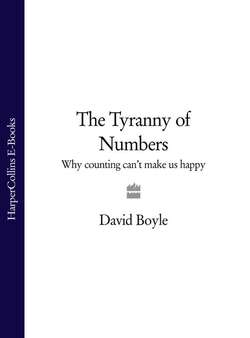Читать книгу The Tyranny of Numbers: Why Counting Can’t Make Us Happy - David Boyle - Страница 19
V
Оглавление‘All emotions were abhorrent to his cold, precise but admirably balanced mind,’ wrote Sir Arthur Conan Doyle, introducing the great detective Sherlock Holmes to the public just over half a century after Bentham’s death. You can point to other figures, from Victor Frankenstein to the Duke of Wellington, who provided role models for human beings as calculating machines – Wellington’s dispatch from the battle of Waterloo was so modestly written that the American ambassador reported back home that he had lost. But it was Bentham the ‘reasoning machine’ who tried to strip morality and government of its emotional and traditional baggage, who made Sherlock Holmes possible, with his detailed knowledge of inks and papers.
‘He was, I take it, the most perfect reasoning and observing machine that the world has seen …’ went on Conan Doyle on the opening page of his first Sherlock Holmes story, ‘A Scandal in Bohemia’. ‘He never spoke of the softer passions, save with a gibe or a sneer … For the trained reasoner to admit such intrusions into his delicate and finely adjusted temperament was to introduce a distracting factor which might throw a doubt upon all his mental results.’
Holmes could use his delicate and unemotional brain to see through the complex fogs of London to the truth, just as Bentham wanted to be able to do with the confusing mists of government. Whether you can actually get to any truth coldly and calculatingly, certainly any truth worth having, is an issue we still don’t know the answer to. The twentieth century has rehearsed the arguments backwards and forwards, balancing the respective claims of the so-called Two Cultures, and probably the twenty-first century will as well. Can science find meaning? Can scientists make any kind of progress without leaps of imagination? We still don’t agree, but we do now live in Bentham’s world. He didn’t have the necessary figures to make his calculations; we are drowning in them. He could not see some of the moral consequences of his ideas; we have some of the more unpleasant Utilitarian creeds of the century etched on our hearts. But he made the rules.
Yet his creed was softened by John Stuart Mill, who rescued utilitarianism for the modern world, so much so that it is now the Western world’s dominant moral creed, among government ministers just as it is among everyone else. He also recognized that Bentham may have been ‘a mere reasoning machine’ and said the same could have been said of himself for two or three years before he learned to appreciate the value of emotions – though there are still precious few of those in his Autobiography. Mill’s repeated depressions showed him also that happiness must not be the conscious purpose of life, or paradoxically, it would slip through your fingers. Bentham would never have understood.
Bizarre measurement No. 3
Gry
(A very small linear measurement proposed in England in 1813 that was intended to make all measurements decimal. 1 gry = 0.008333 of an inch. ‘Gry’ means literally ‘speck of dirt under the fingernail’.)
Number of times every year that hackers infiltrate the Pentagon’s computer system: 160,000
Average time people spend watching TV in the UK every day:
3 hours 35 minutes
